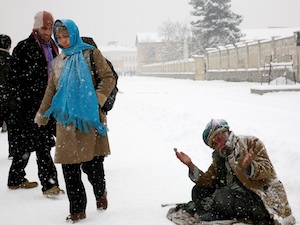 “Where, after all, do universal human rights begin? In small places, close to home – so close and so small that they cannot be seen on any maps of the world.” – Eleanor Roosevelt
“Where, after all, do universal human rights begin? In small places, close to home – so close and so small that they cannot be seen on any maps of the world.” – Eleanor Roosevelt
This morning, on my way to the office, I passed a young woman, let’s call her Fatima, sitting on the footpath, wrapped in a grey shawl, holding a plastic cup and begging for a few coins. She has been in the same place on the footpath for the past 3 weeks. We have all been caught in this difficult and uncomfortable ‘small place, close to home’ and wondered if we should give a few coins or just walk by. I pass by most mornings, confront the question for a moment (of whether to stop or keep moving) and within seconds my mind is onto something else and the question, forgotten.
This story comes from the streets of one of the most affluent cities in Europe – Geneva in Switzerland. This is where Edmund Rice International (ERI) has its offices and where the world’s nations meet, and incredibly, to dialogue about this young woman’s plight. Despite her poverty, she has the same inalienable right to shelter, food and meaningful work as Navi Pilay the High Commissioner for Human Rights. Fatima is on the streets of every city and in every rural village and community in our earth community. Yet her voice is never present and directly heard at the table of Navi Pilay’s human rights meetings. Why not? Doesn’t she have the right to be there? Is it realistic to offer Fatima this option instead of a few Swiss francs?
Many of you volunteer on soup vans and night safety patrols for young people, with St Vincent de Paul, go on immersions to Africa, The Philippines, Timor Leste and Papua New Guinea or join in one of ERC Sydney’s ‘Let’s Talk’ program. Schools are offering immersion experiences to students that change the lives of all concerned. Immersion in another culture has become one of the most powerful, transforming spiritual experiences of our times. You have met Fatima in ‘small places close to home’, asked why?, and decided to do your bit in changing the ‘unjust systems’ that keep Fatima on the streets and, in a larger context, is responsible for the death of 22 000 children each day – a child every 4 seconds. (UNICEF, 2011)
Edmund Rice International (ERI) is part of a new initiative to expand the services offered by the Edmund Rice Network. When we see Fatima our feelings tell us to say hello and drop a coin in her cup? Yet why not invite her to join a meeting with Navi Pilay, to talk, not only about her needs, but her rights as a person? ERI brings the ‘Fatimas’ to Navi Pilay’s table through working with the Advocacy Contact People in each country in which the Edmund Rice dream has taken root (over 30 countries). Shane Wood (Oceania) works with the brothers, volunteers and local marginalized communities to bring their stories forward to the Human Rights Council. ERI seeks to bring representatives of these groups to Geneva to lobby ambassadors and high-level decision makers to change the system that keeps them begging for their daily bread. Each member country of the UN is reviewed by the Human Rights Council every 4 years and has to report to the other 192 states on their performance. This is a powerful tool for holding States accountable for their treatment of the ‘Fatimas’ in their countries.
Standing up for human rights – which every person has as a birthright – is called advocacy. Advocates ask: ‘Why do we have to go back each year to Timor Leste and build schools or provide financial support for the local health clinic?’ Advocacy invites individuals and groups from local communities to find their voice and to speak together in ways that amplify their cries for basic human rights to a crescendo so that politicians and leaders really do have to listen. So gather these voices ‘in small places close to home’ and make a difference in your community.
Find out further information on the human rights based approach to advocacy and how you can become an advocate.
– Peter Harney, ERI Team